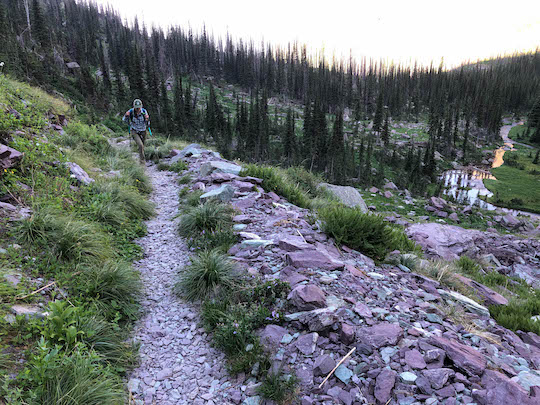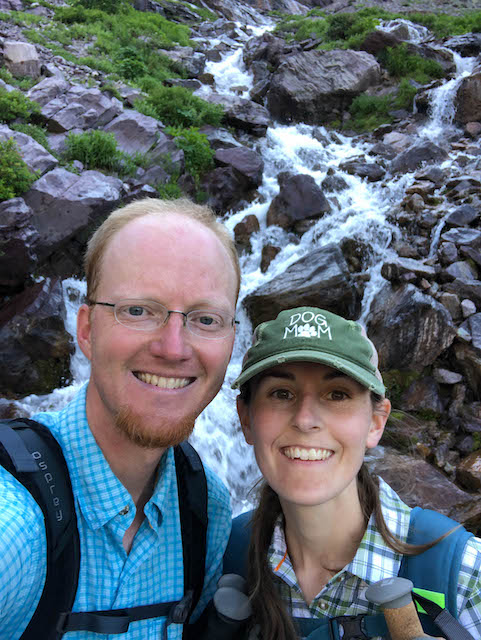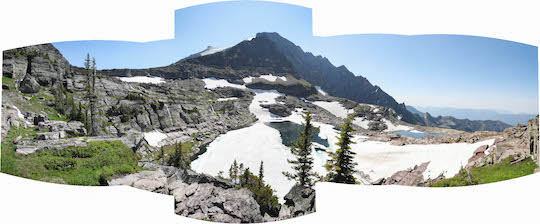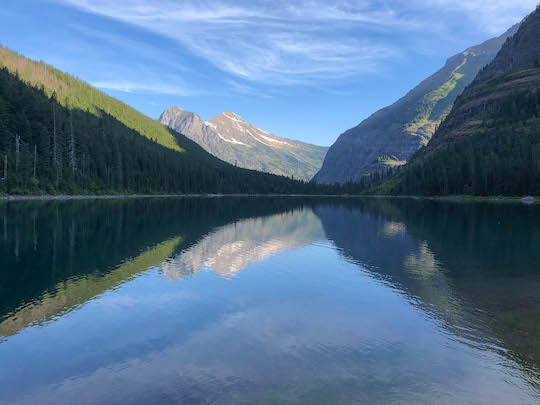This was our last short day before we attempted a big hike. When I say short, some people might disagree as we put about 7 miles on our boots. We were starting to get in a good hiking rhythm, though, and were about ready for much bigger things. To obtain parking, we did our usual early start and caught yet another amazing sunrise. Probably we should have been up another hour earlier and tried to catch the sunrise from Logan Pass, but getting up at 5:00 am seemed reasonably early to both of us but 4:00 am not so much.
Parking and Hiking to Avalanche Lake
As we approached the Avalanche Lake parking area, I could see tons of vehicles already there. Glancing back in the "exit" from the main parking area to the left, I noticed a couple of parking spots. Ignoring what appeared to be full parking ahead and to the right, I quickly swung in and drove around. Coming around the curve in the parking area close to McDonald Creek, I spotted a couple of parking spots still available! We quickly grabbed one. Almost immediately, someone else grabbed the other one. As we ate our breakfast, other cars took up the circling routine like hungry vultures. We had yet again barely made it.
The trail begins across the road from the main parking area. We quickly got across and entered one of the most beautiful cedar groves we saw in Glacier. This portion of the trail is absolutely enchanting. Before long, the trail reached the hillside. Gushing out from a small canyon was Avalanche Creek which the trail roughly follows all the way to the lake. The stream stays out of sight much of the time. However, at the beginning of the climb, it gets close to the little slot canyon where the stream pours out into the flat cedar grove just above McDonald Creek.
If the Hidden Lake Trail was the busiest we hiked, this one was not noticeably behind. People were everywhere. As this was a narrower trail, people were being just a little funny about COVID. We tried to be careful and stay respectful which is tricky when your hiking pace is significantly faster than probably 98% of the other hikers. Thankfully, everyone else was being nice as well, and soon we were finally approaching the lake.
Avalanche Lake in Glacier National Park
Avalanche Lake is stunningly beautiful. The glacial snowmelt contributes to one of the most incredible colors I've seen anywhere. I've been trying to decide what color this is, but so far I don't have a good description. Maybe I need to buy a box of Crayola crayons to help. What color do you see peeking through the trees here?
The trail basically runs into the bottom end of the lake. We stumbled out amongst the rocks and boulders just like everyone else. The sun was rising higher and threatening to burst over the ridges at the head of the lake. The perfectly calm lake surface produced a remarkable mirror effect. The surrounding hillsides and waterfalls were reproduced in the tranquil lake surface.

At this point in our hike, I actually wished we had gotten an earlier start. This didn't happen often during our time in Glacier. However, the lighting, while dramatic, would have been better much earlier before the sun started striking the opposite ridges. If I ever have this to do again, I would like to hike both earlier and later when the sun is straight overhead. There are different advantages to each light situation and we enjoyed the one we were gifted with to the utmost. As the sun continued to creep closer and closer to cresting the ridge, dazzling shafts of sunlight moved ever lower down the ridges and evergreens.
Eventually, we worked our way all the way to the head of the lake and took in the views looking back the other way.
At this point, I came close to fishing a bit. As you'll recall from adventures of
previous days, I was carrying a Tenkara rod with me on most of our hikes. You just never know what you might find. There were occasional fish rising, and I was itching to catch some more cutthroat. These beautiful fish are always a treat since we don't have them in Tennessee. Unfortunately, it was not to be on this particular hike. We had ample time, but the fish were rising just a little too far out. Thus the limitations of Tenkara eventually came back to haunt me. I still greatly enjoy fishing this way, but at least once on our trip, I wished I had carried a regular fly rod.
We were enjoying the lake, but decided to try and get some more done on this day. We had a lot of exploring that we could still do in the Polebridge vicinity so we started back down the trail. One last selfie was in order as the sun finally burst over the ridge.
Down at the bottom, we wandered through the cedar grove and stopped long enough for a picture of Avalanche Creek. The colors of the rocks and water were almost like a painting.
When we got back near the car, we discovered something interesting. At this point in our visit to Glacier National Park, we were getting serious about keeping track of our hiking mileage. We were still a 1/4 mile short of seven miles and were wanting to push the numbers up a little. Instead of getting in and leaving immediately, we instead wandered down to McDonald Creek and took in the scenery there. A little walking up and down the shoreline along with taking some pictures increased our total mileage to just over seven miles for the day.
My wife was keeping meticulous record of our distances with her Garmin Forerunner 235. I was starting to get into the spirit of things and wanted to see how far we could push our total mileage. After four days, we were sitting at 24.08 miles. We needed to seriously pick up the pace if we wanted to hit any big numbers. The next day was the first push for big miles. Our legs were feeling fresh and ready to go.
Back to Polebridge and Visiting Bowman Lake
We were beginning to enjoy our daily drives up to Polebridge. While I wasn't getting anymore fishing in up there, I knew it was available if the urge struck. There were still lots of places to explore, however, and we were wanting to see what we could find. When we reached the Polebridge entrance, we pulled up to the small entrance station and were surprised to find it occupied. The ranger there was nice and advised us that we probably couldn't make it to Kintla Lake but that Bowman Lake would probably work with our Toyota Corolla. Naturally, we headed towards Kintla Lake.
Our assumption was that the ranger was probably recommending Bowman Lake to all visitors, so perhaps there would be more wildlife towards Kintla. If and when the road got too bad, we would just turn around. We never did figure out if our assumption was bad or if there were just a lot of visitors. Either way, we hadn't made more than a couple of miles before deciding to turn around. There was a ton of traffic and we assumed that it would scare off any wildlife that might have been otherwise around. We did find a few wildflowers including the harebells (first picture) and sticky purple geranium (second picture) below. There were also nice views of the distant mountains, but otherwise this was a wasted drive.

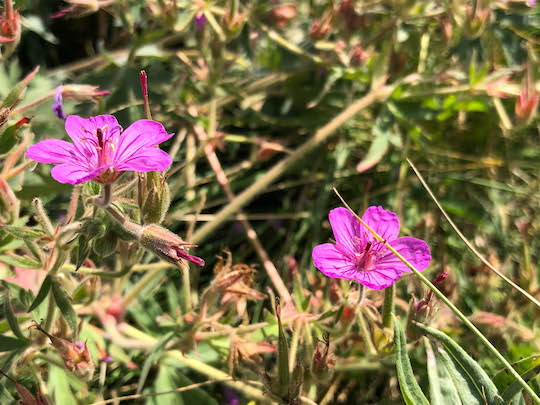

The turnoff to Bowman Lake was back near Polebridge and we decided to try and make the drive. Our little car was great for gas mileage, but the rough roads made me slightly uneasy. In my younger days, I've taken sedans down some truly ridiculous jeep trails roads. However, we were in my wife's car, and I didn't want to mess it up too badly. The road to Bowman Lake wasn't bad thankfully. There were a few rough spots, but nothing that simply slowing down wouldn't help. We arrived at the lake and quickly found parking before strolling down to the shoreline.
Like most of the west side lower elevation lakes, Bowman was huge with the headwaters back near the mountains of Glacier National Park. We briefly contemplated a hike, but instead just wandered briefly around and then headed out. The next day we were hoping for a new hiking personal best and wanted to get a good night's rest.








